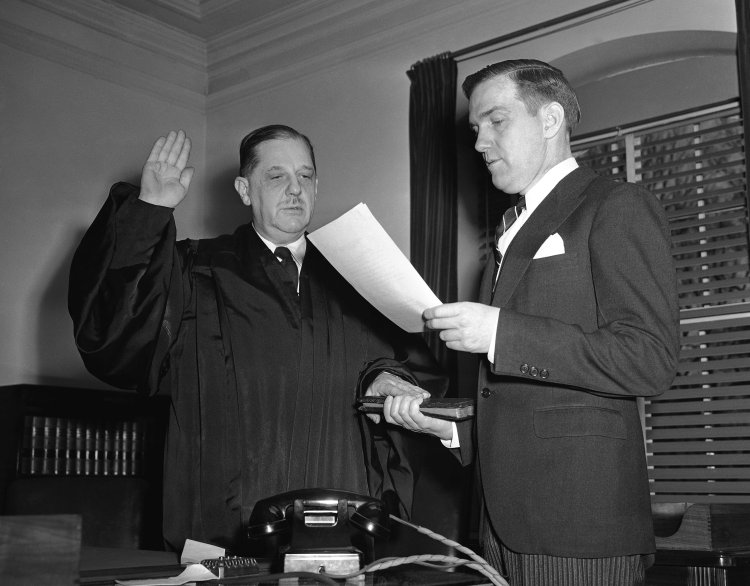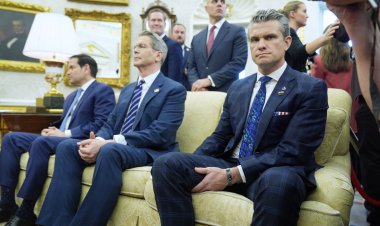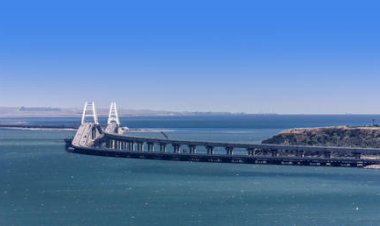During an Era When Attorneys Hesitated to Represent Adversaries of the State, a Singular Law Firm Took a Stand
A determined law firm took on the challenge of representing federal employees accused of disloyalty and managed to grow into a formidable legal powerhouse.

“Paul, I understand your firm is engaged in defending communists and homosexuals,” the man sneered.
“That’s right,” Porter shot back, then deadpanned: “What can I do for you?”
In the years that followed, this encounter— or a variant of it— became part of the legend surrounding Arnold, Fortas & Porter. It illustrated the firm’s commitment to civil liberties cases amid increasing governmental intrusion into the lives of countless employees, a stance starkly contrasting with a legal community largely hesitant to engage for fear of losing clients or attracting the ire of Sen. Joseph McCarthy.
Founded in 1946, the firm emerged at the onset of the Red Scare, a period marked by anti-communist paranoia that led to extensive investigations into many Americans’ beliefs and affiliations. While concerns regarding Soviet espionage were genuine, the situation quickly turned into a climate of hysteria. The moment called for a robust defense of civil liberties, and Arnold, Fortas & Porter was among the few firms that accepted the challenge.
Today, we observe a similarly fragmented legal community grappling with how to navigate a burgeoning crisis in a landscape of confusion and trepidation. Following concessions made by the firm Paul, Weiss to avert presidential retribution, many observers expressed concern that other elite law firms— populated with some of America’s top legal talent— might also chose compliance.
It is essential to distinguish the circumstances of that era from those we face today; Arnold, Fortas & Porter did not contend with an administration intent on exacting revenge against perceived adversaries. Nonetheless, the firm’s history stands as an inspiring example of principled resistance when many of its contemporaries opted for silence.
Thurman Arnold hadn’t initially planned to enter the loyalty field when he approached Abe Fortas, one of his former Yale Law School students, to start a firm together. Both were seasoned New Deal veterans: Arnold had led the antitrust division at the Justice Department prior to serving as a judge on the D.C. Court of Appeals, while Fortas had held the position of undersecretary of the interior. A year later, they welcomed Porter, a former chair of the Federal Communications Commission, into their partnership.
They envisioned establishing a commercial practice that would attract well-heeled corporate clients, supplemented by a moderate amount of pro bono work. However, they soon found themselves entangled in loyalty cases arising from a new, extensive system of personnel checks instituted by President Harry S. Truman to uncover Soviet spies.
Truman’s loyalty program, spanning five and a half years, resulted in 4.76 million background checks at an annual cost of $25 million. The screening generated 26,236 FBI field investigations, many leading to necessity of appearances before the loyalty review board. Ultimately, 6,800 individuals either resigned or withdrew their job applications, while 560 were dismissed.
The scheme was theoretically justified due to genuine fears of Soviet infiltration but was prone to significant abuse in practice. Much of the evidence presented at review boards was anonymous; in countless instances, defendants were unaware of the specific allegations against them. Unlike court proceedings, these administrative hearings did not provide the usual due process protections, despite Arnold’s assertion in a 1947 letter that the damage to an individual’s reputation was profound. “The dismissal of a government employee on charges of disloyalty or for security reasons,” he remarked, “is a penalty more severe than the conviction for a crime.”
The firm’s first significant case involved Dorothy Bailey, a mid-level supervisor at an agency that trained local employment officers— clearly not a sensitive role. An anonymous informant accused her of being a Communist or affiliated with a Communist organization, claims she vehemently denied. In 1948, when Bailey was summoned before a review board, she sought representation from Arnold, Fortas & Porter.
The partners quickly mobilized: all three helped her prepare an affidavit, and Porter accompanied her to the hearing. Ultimately, however, the board ruled against her. Under the low threshold stipulated by Truman’s directive, it needed only to find “reasonable ground” to suspect her disloyalty. Rejecting the board’s decision would equate to challenging the credibility of the FBI and its influential director, J. Edgar Hoover. Bailey was subsequently terminated in February 1949.
Arnold and Porter then took the case to court, eventually presenting it before Arnold’s former colleagues on the D.C. Court of Appeals. They called on the FBI to testify, but its agents declined to appear, citing confidentiality. “It is unthinkable that the president of the United States in this un-American manner puts federal employees at the mercy of secret police,” Arnold asserted in a brief.
Nonetheless, Bailey lost 2-1 on a technicality— two judges contended that, however unjust the process seemed, she was not technically a civil servant and thus had limited job protections. By 1951, the Supreme Court was deadlocked on her case, with a 4-4 split making her dismissal final.
Despite the setback, the absurdity of the proceedings propelled Arnold, Fortas & Porter to continue their fight. Others took note; by 1949, similar cases began flooding into their offices on 19th Street in downtown Washington. Soon, the firm found itself dedicating nearly half of its potentially billable hours to pro bono work.
The firm established criteria regarding the clients it would represent. Notably, it refused to accept avowed Communists, as the partners were firmly against communism and understood that the Communist Party’s demands for legal strategies could undermine their credibility. Additionally, as historian Spencer Weber Waller notes in his book *Thurman Arnold: A Biography*, such a position enhanced the firm’s authenticity in advocating for genuine clients.
The loyalty-review process became a troubling reality in the Red Scare environment, where most cases received scant media attention—often reduced to brief articles that frequently mentioned Arnold, Fortas, or Porter as counsel. Most cases pertained to low-level government employees in obscure federal agencies—individuals who, due to their lack of prominence, were hardly security threats yet faced relentless persecution from a process spiraling out of control.
Among those clients who attracted front-page headlines was Owen Lattimore. A respected expert on China with an academic position at Johns Hopkins, Lattimore was branded by conspiracy-driven conservatives as a pro-communist agent based on a few critical remarks about the Chinese Nationalist government. In a speech in early 1950, McCarthy labeled Lattimore as the nation’s “top Soviet spy.”
At that time, Lattimore was abroad in Afghanistan. He alerted his wife to engage Fortas immediately, then hurried back home. McCarthy's accusations prompted extensive investigations, leading to months of hearings before two Senate committees, as well as two indictments from the Justice Department for perjury. A lawyer from Arnold, Fortas & Porter remained with him throughout the proceedings, concluding in 1955 when the government dropped the case altogether. The firm later estimated that the Lattimore case, entirely pro bono, cost them the equivalent of $2.5 million today.
Despite the associated risks, Arnold, Fortas & Porter’s involvement in loyalty cases did not lead to its demise. The firm steadily expanded and is now known officially as Arnold & Porter Kaye Scholer, one of the largest law firms globally, employing over 1,000 lawyers in six countries. In fact, standing firm during the Red Scare cultivated a reputation for boldness, with minimal repercussions in terms of lost business—though it is noted that at least one client, Sun Oil, is said to have severed ties over the firm’s civil-liberties efforts.
Consequently, some have scrutinized the motives behind Arnold, Fortas & Porter’s actions, speculating that they may have served as a marketing strategy. However, if such was the case, it was a considerable gamble, one that the three esteemed founders did not channel. If it were an advantageous gimmick, one must ask why Arnold, Fortas & Porter was the only firm to undertake it.
The reality is that Arnold, Fortas, and Porter—along with many of the associates they hired— possessed profound commitments to civil liberties, coupled with an outsider’s indignation toward injustice, especially in a time when the prevailing consensus encouraged submission.
Arnold, a Wyoming native, maintained a rebellious streak throughout his life. “He was fearless enough, enough of an iconoclast, valued government service, and viewed this through his genuinely patriotic values,” Waller emphasized. Fortas, having grown up as an Orthodox Jew in Memphis, understood the vital need to protect the vulnerable. Meanwhile, Porter, despite holding a law degree, spent much of his career as a liberal journalist in the Jim Crow South, granting him firsthand experience with inequality.
While it may not be entirely reasonable to use the Red Scare experiences of Arnold, Fortas & Porter as a benchmark for contemporary law firms facing potentially severe repercussions, it is equally crucial to acknowledge the firm’s early decision to advocate for principles rather than conform to societal pressures, a choice that ultimately secured a lasting legacy beyond the government’s ideological witch hunt.
“We were scared,” Fortas recounted years later.
Olivia Brown for TROIB News












